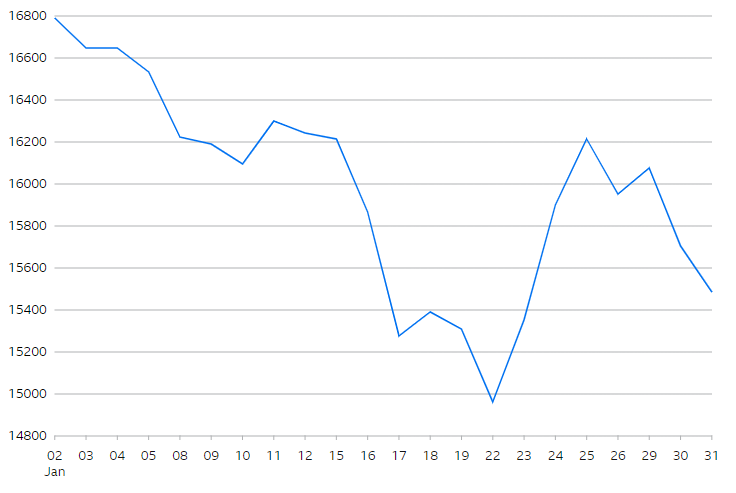
This is part of our monthly pension update series. Catch up on last month’s summary here: What happened to pensions in December 2023?
The fluctuations in your investments, such as your pension, are influenced by both ‘micro’ and ‘macro’ factors. Each pulling or pushing your investments in their own way. Imagine your investments as a small boat in a vast ocean. Two sets of waves affect them: tiny ripples and big waves.
Tiny ripples are micro factors. These are close-up details, from the profitability of the companies you’re invested in to whether those companies have released new products. By investing in many companies, known as diversification, your investments are less shaken by the rise or fall of a few outliers.
Big waves are macro factors. These influence how the whole economy moves, and could be things like interest rate changes or geopolitical tensions. They affect everyone in the ocean, not just your boat. Macro factors can have a big impact, even on diversified investments. For this reason investors tend to keep an eye on trends in the global economy.
Keep reading to find out how markets have performed this month and what key trends could shape the global economy, and your pension, in 2024?
What happened to stock markets?
In the UK, the FTSE 250 Index fell by almost 2% in January.
 Source: BBC Market Data
Source: BBC Market Data
In Europe (excluding the UK), the EuroStoxx 50 Index rose by almost 3% in January.
 Source: BBC Market Data
Source: BBC Market Data
In North America, the S&P 500 Index rose by almost 2% in January.
 Source: BBC Market Data
Source: BBC Market Data
In Japan, the Nikkei 225 Index rose by over 8% in January.
 Source: BBC Market Data
Source: BBC Market Data
In the Asia Pacific (excluding Japan), the Hang Seng Index fell by over 9% in January.
 Source: BBC Market Data
Source: BBC Market Data
Key trends to watch in 2024
The value of a company is influenced by its performance, which in turn is impacted by the wider economy too. Here are five key trends that could shape the global economy, and your pension, in 2024.
1. Elections making headlines
The year ahead promises to be monumental for global politics. Almost half of the world’s population will cast their ballots in national elections. That equates to over four billion people across more than 50 democratic countries.
Elections likely to gain significant news coverage include:
- Russia’s presidential elections in March;
- India’s parliamentary elections in April and May;
- EU parliamentary elections in June;
- US presidential elections in November; and
- the UK’s general election, which is set to take place at some point in 2024.
The outcome of these elections will shape international trade and the global economy for several years to come.
2. Growing geopolitical tensions
There has been a rise in global tensions and conflicts. The world is facing the highest number of violent conflicts since the Second World War, with around two billion people living in these areas of conflict. Russia’s ongoing war against Ukraine has cast a long shadow on the global economy. When the full-scale invasion began two years ago, a series of economic shocks unfolded.
With the international supply of key exports restricted or suspended, prices rose sharply causing inflationary pressures on households. Central banks began raising interest rates and companies suffered under these uncertain conditions. We’re still experiencing a slow recovery from this. It’s difficult to predict the long-term effects of the latest conflicts in the Middle East and how long those shocks might last. This adds an additional layer of uncertainty to the global economic outlook.
3. Falling inflation
The global economic recovery remains slow, according to the International Monetary Fund. In the UK, inflation was at 4% in the 12 months to December 2023. This is double the Bank of England’s target of 2%. In February 2024, the Bank Rate was maintained at 5.25% for the fourth month running. This remains the highest it’s been since 2008.
This is being mirrored in other major economies, such as the Federal Reserve in the US which currently has rates between 5.25% and 5.5%. Experts anticipate the UK’s Bank Rate will drop to 3% and inflation will fall to 2% by the end of 2025. This slow and steady approach aims to give the UK economy a soft landing in the next two years.
4. Renewables gaining traction
The push for cleaner energy sources is expected to accelerate in 2024. Companies and governments are setting increasingly ambitious decarbonisation targets, with some US utilities aiming for 80% carbon reduction by 2030, exceeding previous net-zero by 2050 goals. Renewable energy costs are falling, making them increasingly competitive with fossil fuels.
Additionally, rising concerns about climate change and energy security are prompting a shift towards renewable options. As the clean energy sector continues to prove its potential, it’s attracting the significant investment needed for expansion.
5. Artificial Intelligence booming
The Artificial Intelligence (AI) revolution is underway. The bad news is that over the next five years 14 million jobs will be replaced by new technologies, according to The World Economic Forum. The good news is that an AI gold rush is widely predicted.
By 2032, experts predict that AI-powered digital advertising will generate a staggering $192 billion annually, while the market for dedicated AI servers could reach $134 billion. These figures underscore the vast potential of AI to revolutionise industries from marketing to healthcare. Those investing in these AI companies could financially benefit from this.
In summary
The past four years have been wildly unpredictable. 2020 and 2021 rocked our small boat with broken supply chains, a devastating pandemic, and stalled growth. Then came the rollercoaster of 2022 and 2023, with inflation spiking, energy prices sent us into rough seas, and the recovery felt shaky. But here is the good news; the outlook for 2024 and 2025 appears stronger. This could be the period we start to regain a more solid economic footing.
Inflation, while still high, is finally cooling down. Supply chains are healing, and growth, though slow, is back on track. The next two years are crucial. It’s all about stabilising prices, reviving growth, and finding that “pre-pandemic normal” for interest rates and inflation. Central banks and governments will be juggling inflation control with economic support, a tricky balancing act.
Even so, geopolitical and economic tensions around the world remain high. With elections looming in several countries, including the UK, there’s still potential for future turbulence. In any case, pension saving is usually a marathon and not a sprint. It’s worth remembering that it’s normal and expected for pensions to go up and down in value over time.
This is part of our monthly pension update series. Check out the next month’s summary here: What happened to pensions in February 2024?
Have a question? Get in touch!
You can check out our Plans page to learn how your money is invested in different assets and locations. You can always send comments and questions to our team via engagement@pensionbee.com.
Risk warning
As always with investments, your capital is at risk. The value of your investment can go down as well as up, and you may get back less than you invest. This information should not be regarded as financial advice.



